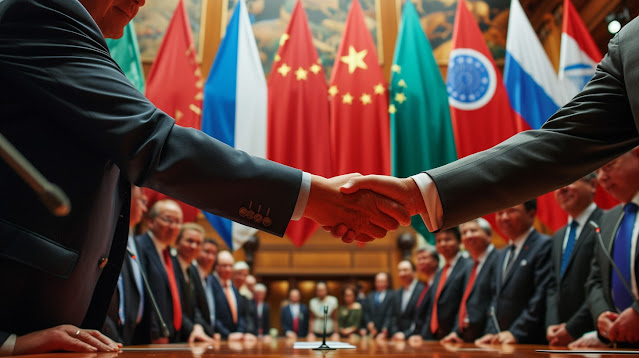Submit Review: The Impact of Colonialism and Imperialism on Modern-Day Geopolitics
The Impact Controversies and Solutions of Colonialism and Imperialism on Modern-Day Geopolitics:
Colonialism and imperialism have profoundly shaped the world we live in today. These historical forces have created lasting economic disparities, political tensions, and cultural transformations that continue to influence modern-day geopolitics. This article examines the intricate legacy of colonialism and imperialism, addressing both their controversial impacts and potential solutions to mitigate their adverse effects.
Historical Context of Colonialism and Imperialism: Colonialism refers to the practice of acquiring and maintaining colonies, where one country exerts control over another territory. Imperialism is the broader policy or ideology of extending a country's influence through diplomacy, military force, or other means. From the 15th to the 20th centuries, European powers such as Britain, France, Spain, and Portugal established vast empires, exploiting resources and labor in Africa, Asia, and the Americas.
Economic Impacts:
The economic structures established during colonial times have had long-lasting effects on former colonies. Colonial powers extracted vast amounts of resources, leaving behind economies that were dependent on a narrow range of exports and ill-prepared for diversified growth.
Resource Extraction and Economic Dependency:
- Colonies were often forced into economic systems that prioritized the export of raw materials to the colonizing country. This extraction-centric economy left many post-colonial states with limited industrial bases and economies heavily reliant on a few commodities.
Infrastructure and Development Disparities:
- Colonial powers invested in infrastructure primarily to facilitate resource extraction and control, rather than to benefit local populations. This led to uneven development and significant disparities in infrastructure quality across regions within former colonies.
- Political Impacts:
Colonialism and imperialism have left deep political scars, including arbitrary borders, weak institutions, and lingering conflicts.
Arbitrary Borders and Ethnic Conflicts:
- Colonial borders often disregarded ethnic, cultural, and linguistic boundaries, leading to the creation of states with diverse and sometimes antagonistic groups. This has been a major source of internal conflicts and political instability in many regions, particularly in Africa and the Middle East.
Weak Political Institutions:
- Colonial powers often undermined or co-opted local governance structures, leaving behind weak institutions that struggled to manage post-independence challenges. Corruption, lack of accountability, and political instability are common legacies of such weakened political systems.
- Cultural Impacts:
The cultural effects of colonialism and imperialism are profound, leading to the erosion of indigenous cultures and the imposition of foreign values.
Cultural Erosion and Identity Crisis:
- Colonial regimes frequently imposed their language, religion, and cultural practices on colonized peoples, leading to the erosion of indigenous cultures. The resulting identity crises continue to affect post-colonial societies, as they navigate the complex interplay of traditional and colonial influences.
Cultural Appropriation and Misrepresentation:
- The legacy of colonialism also includes the appropriation and misrepresentation of indigenous cultures by former colonial powers. This has led to widespread stereotyping and the commodification of cultural practices.
- Contemporary Challenges:
The legacies of colonialism and imperialism manifest in various contemporary challenges, from economic underdevelopment to geopolitical tensions.
Economic Underdevelopment and Inequality:
- Former colonies often struggle with poverty, inequality, and underdevelopment, compounded by global economic systems that favor developed nations. These issues are exacerbated by debt, trade imbalances, and the lingering effects of colonial economic policies.
Geopolitical Tensions:
- The geopolitical landscape is still heavily influenced by colonial histories. Territorial disputes, regional conflicts, and neo-imperialistic practices by powerful nations continue to shape global politics.
Social and Racial Inequality:
- Colonialism's legacy includes entrenched social and racial hierarchies. These inequalities are evident in various forms, from systemic racism in former colonial powers to social stratification in former colonies.
- Creating Solutions:
Economic Reparation and Development Aid:
- Former colonial powers can play a role in addressing economic disparities through reparations and development aid. This support should focus on sustainable development, infrastructure improvement, and capacity building to foster economic independence in former colonies.
Strengthening International Cooperation and Fair Trade:
- Promoting fair trade practices and international cooperation can help rectify imbalances created by colonial exploitation. Ensuring that trade agreements benefit developing nations can contribute to more equitable global economic growth.
Cultural Revitalization Initiatives:
- Supporting efforts to revitalize and preserve indigenous cultures is crucial. This can include funding for cultural programs, education initiatives that teach indigenous languages and traditions, and protecting cultural heritage sites.
Reevaluating Political Boundaries and Promoting Regional Integration:
- Encouraging dialogue and cooperation to address the legacy of arbitrary colonial borders can help resolve conflicts. Regional integration initiatives can promote economic and political stability by fostering collaboration among neighboring countries.
Human Rights Advocacy and Justice Mechanisms:
- Establishing truth and reconciliation commissions can help address historical injustices and human rights abuses. Promoting human rights education and advocacy is essential for healing and rebuilding post-colonial societies.
Enhancing Global Governance and Representation:
- Reforming international institutions to better represent the interests of former colonies can contribute to a more equitable global order. This includes giving developing nations a stronger voice in decision-making processes at organizations like the United Nations and the World Trade Organization.
- Case Studies:
The Partition of India:
- The partition of India and Pakistan in 1947 is a stark example of the consequences of colonial border drawing. The hurried and poorly planned partition led to massive violence, displacement, and ongoing conflicts between the two countries.
The Scramble for Africa:
- The Berlin Conference of 1884-1885, where European powers divided Africa without regard for ethnic or cultural boundaries, has had lasting effects on the continent. Many African nations continue to grapple with the arbitrary borders and the conflicts they have engendered.
Algeria's War of Independence:
- The brutal war of independence from France left Algeria with deep political and social scars. The conflict's legacy includes a centralized military-dominated political system and ongoing struggles with democracy and human rights.
Conclusion: The impact of colonialism and imperialism on modern-day geopolitics is profound and multifaceted. Addressing these complex legacies requires a comprehensive approach that includes economic reparations, cultural revitalization, political reconciliation, human rights advocacy, and global governance reform. By acknowledging the past and actively working towards solutions, the international community can help create a more just and equitable world.















Comments
Post a Comment